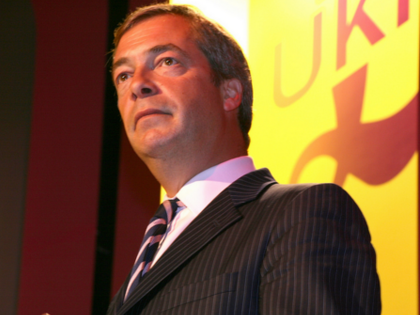
The UK Independence Party (UKIP) has hit a record high ComRes poll rating, as the Conservative and Liberal Democrat parties both drop points. UKIP is now polling at 20 percent, while Britain’s traditional third party, the Liberal Democrats, have sunk to just 7.
The Independent on Sunday and Sunday Mirror poll shows Labour (35 percent) increasing its lead to six points over the Conservative Party (29 percent), with the libertarian, small-government UKIP hot on the heels of Cameron’s party following the resignation of cabinet minister Maria Miller last week.
The poll results also reflect the two debate victories that UKIP leader Nigel Farage clocked up against Deputy Prime Minister Nick Clegg over the past few weeks. Despite some negative press since then, UKIP continues to rise, while the three mainstream parties are either losing voters, or stagnating.
Labour’s new six point lead is not a reflection on the party’s increasing popularity either. The poll shows Labour has not lost, nor picked up any voters since the March survey. Instead, Ed Miliband’s party is benefitting from a Conservative Party in disarray. With just 40 days until the European Parliamentary elections, the poll is being viewed as highly significant.
The Liberal Democrat figure is the lowest result ever recorded by ComRes online polling, which started in 2010. The Conservative Party figure is the first time the party has been below 30 percent in 2014.
At the same time, Nigel Farage is now neck and neck with Prime Minister David Cameron in popularity ratings. Twenty-seven percent of the British public have a positive view of the two leaders, while 20 percent like Ed Miliband, and just 12 percent view Nick Clegg favourably.
The poll of 2,003 people also asked questions about the direction of Britain’s economy, and who Britons regard as having been the best prime minister since 1964.
Despite Britain’s economy growth forecasts, 50 percent of those polled said they are in a worse financial position than they were in 2010. Thirty-five percent said they were better off.
ComRes reports: “Margaret Thatcher emerges at the top of the league of British prime ministers since 1964, with the current incumbent [David Cameron] in second place and Harold Wilson, often regarded as a scheming fixer in his time, coming third. Sir John Major has waited a long time to outpoll Tony Blair, who defeated him in 1997.”
The long and drawn out resignation of Cameron ally Maria Miller is said to have seriously damaged the Prime Minister’s reputation, as well as the favourability of his party. Sixty-two percent of people said they believed he displayed a “serious lack of leadership” over the issue, while 59 percent of Britons are now said to favour a right of recall bill, where constituents can force their MPs to fight a by-election if enough local people sign a petition to have them removed. Just 14 percent said they disliked the idea.
Mike Smithson, of the Political Betting website, wrote that the Liberal Democrats “could be paying the price for Clegg’s debate gamble”. He tweeted, “Seriously bad polls for [Liberal Democrats] tonight from both ComRes & Opinium. Both have party down on just 7%”.
Last week, a Breitbart London poll revealed that over a third of 2010 Conservative Party voters would be less likely to vote Conservative at the next general election due to the party’s support for and handling of the Maria Miller expenses episode.
Gawain Towler, a UKIP candidate for the European Parliament told Breitbart London: “It’s only a poll, but one which chimes with our response on the ground across the country. Of course the only polls that really count are the elections themselves, but I reckon the Lib Dems are feeling pretty queasy this evening”.

COMMENTS
Please let us know if you're having issues with commenting.